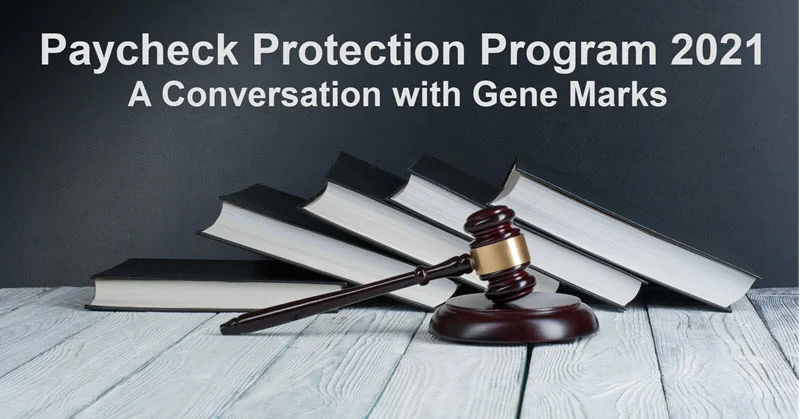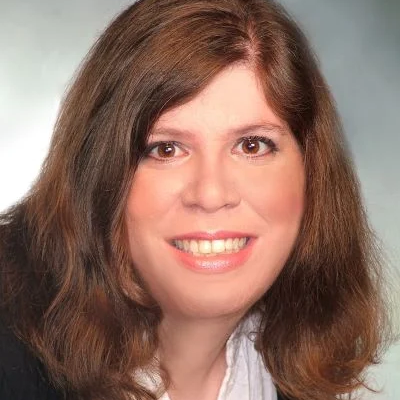Joining us today is Gene Marks from the Marks Group PC. He is an author, a speaker on small business expertise, and a CPA. He has presented at Scaling New Heights. He was one of our guests on the Round Tables back in March for the CARES Act when we were trying to figure out what was happening with coronavirus relief. He writes regularly for The Hill, the Philadelphia Inquirer, Forbes, Entrepreneur Magazine, and The Guardian, and appears regularly on MSNBC, CNBC, Fox Business and Fox News. He’s the author of six books on business management and comes to us today compliments of our friends at Patriot Software, a leading payroll provider which works with QuickBooks Integrated Payroll.
Gene Marks: A few more things I’d like to get in here: Forgiveness is a big thing. The big breath of relief here is that because of this new legislation, any existing loans under $150,000 or new loans in a second round will be automatically forgiven. The banks are going to have this sign-off form where you, the borrower, are going to have to attest and represent that you spent the money on certain things and you brought the number of employees back up to the levels that you need to bring the back up to. It's a single form that you're going to fill out. And that's it. No submitting of documentation or calculations, nothing like that. It doesn't mean the SBA can't come back to you if they suspect that there's fraud or something. But for the most part, if you've got a loan under $150,000, your forgiveness process is going to be a snap.
And remember you still have 10 months to apply for forgiveness after your forgiveness period ended. Whether you choose that eight week or the 24 week period, you've got 10 months. You don't have to rush into it. Relax and wait; the banks are going to have this document from the SBA soon, and then you can get it out of the way.
If you have a loan that's greater than $150,000, the forgiveness calculation has been expanded. It's still the payroll, payroll-related expenses and rent. But now they're allowing you to include software, cloud computing technologies, any property damage costs that you might have incurred as a result of the disparate public disturbances that happened in 2020, or certain costs for your suppliers, or costs for worker protection. Those are all things that are now eligible for forgiveness.
Remember that ratio of 60:40. If you're going to apply for forgiveness, 60% of your expenses must be payroll and 40% can be those non-payroll expenses that I just mentioned, but again there has been a sizable increase.
Joe Woodard: I've got an interesting question. If your loan is under $150,000, you can fill out a form and automatically have your loan forgiven. Does that mean that people who do this have pre-spent their funds?
Gene Marks: Well, frankly, yes it does. If you apply for forgiveness, then basically that loan has been closed and forgiven, even if you've started the process of doing it and submitted the documentation. Your lenders should be able to work with you to get a second PPP loan, again, assuming that you qualify for a second PPP loan.
Joe Woodard: Well, that's going to make it a lot easier than $150,000 or more that that might have to go through the forgiveness application. But what about if 100% of their PPP proceeds were burned in payroll, then maybe the 941s are enough. How does this information flow? Obviously, as soon as we hear things, we're going to publish updates. But where would you tell us to stay tuned?
Gene Marks: Any recent changes are going to be published on the Treasury Department's website at treasury.gov, and on the SBA website which is sba.gov. But the people that are going to have the most up-to-date information about PPP will be your banks or your lender. You want to stay in close communication with them to find out if there have been any changes. If they are on top of their game, they should be the ones that are updating you regarding PPP.
Joe Woodard: I have quite a few questions about the 12/27 date forgiveness. Taxability of forgiveness can vary, depending on whether you were previously forgiven. This provision is effective only for loans forgiven under Section 1106 of the CARES act as amended by the section.
Gene Marks: This new law says that for all PPP loans, whenever they began, whichever round, whatever expenses that you are using for forgiveness are fully deductible. There are no dates.
We all need to be aware of the new loan forgiveness rules for SBA loans because this has changed. It's now available to all companies, regardless of whether you have been affected by COVID-19 or not. The SBA has two very popular loan programs: the Section 7A loan and the 504 microloan programs. They've been in existence for a while. If you or your clients have an existing 7A or 504 loan, they can get up to eight months of forgiveness on their principal and interest payments. Because of this bill, they get an automatic three months of forgiveness on this loan. And if they're in a certain hard-hit industry like restaurants, food service, or entertainment, they can get an additional five months. It's all kept at $9,000 a month.
If you or your client want to apply and get accepted for a new Section 7Aor 504 microloan before September 20 of this year, you can get up to six months of those loans completely forgiven - both principal and interest. That’s $9,000 a month to $54,000 taken right off the top on either of those two loans.
In addition, you receive forgiveness on any of the fees that are charged as part of getting these loans, like guaranteed fees, which can be a little expensive. To incentivize the banks, the SBA is now allowed to guarantee 90% of those loans. Before, it was 75%, so that means more banks will have an incentive to get these loans out there.
If you were affected by COVID-19, you can get terms anywhere from five to 25 years and up to $5 million in financing. You can use this money to buy equipment or for working capital. If you want to hire people that are out there, if you want to buy inventory, if you want to buy another business or a competitor’s business, building or property, all these loans are completely eligible. There is financing for that. The 504 loan is for economic development. There are some requirements to do some hiring, but other than that, this is an unbelievable deal.
If you've got any clients out there that are arranging for financing, tell them to go to a bank that is an SBA lender and get a 7A loan or 504 microloan. They can immediately save up to $54,000 on a new loan. This opportunity expires September 20, 2021.
Joe Woodard: Fantastic. So if somebody applied for forgiveness during the first round but they were only partially forgiven, can they amended their forgiveness application now that forgiveness has been expanded?
Gene Marks: Yes. If that’s the case, you need to go back to your banker and amend your application, because these rules are retroactive. Trust me, your banker will be thrilled, because it makes it easier for them.
Joe Woodard: And is grant money taxable? I know we already talked about how PPP doesn't count as gross receipts and the EIDL proceeds are obviously loan proceeds.
Gene Marks: Grant money is not taxable.
So you had to show a revenue loss of 50% this quarter compared to the corresponding prior years quarte to be eligible for PPP. Now you have to show 80% revenue lost this quarter of 2020 verses 2019 to be eligible. You don't even have to show that if you can prove that your business was shut down for any period of time by local or estate government bodies. Then you would qualify in that quarter for the employee retention tax credit.
Joe Woodard: What documentation is required to prove that? Is it like an income tax return, with the honor system applying to it?
Gene Marks: Say that it's the fourth quarter of 2020. To show that, you're going to have to prove that to the bank and your lender. They’re going to be asking for your general ledger, your bank statements, and other documentation to prove your revenue loss. It's really going to be up to the lender to determine whether you fulfill that criteria. Unless you filed your tax return (which nobody has done for 2020 as yet).
Joe Woodard: Is there any pre-indication, or anything written into the legislation about whether PPP loan and forgiveness applications will be made public?
Gene Marks: I know that there was a push to make public EIDL loans and some of the larger PPP loans that went out before. My expectation is that it could very well happen again. If you're going to participate in this type of a program, you would probably need to brace yourself for the fact that your information might be made public.
Joe Woodard: I believe the disclosures went all the way to 100% of PPP recipients in the first wave. So I'm with Gene on that. Tell your clients that the likely outcome is this will become public information.
I want to say one final thing: Please charge for the services. I cannot tell you how many people have come up to me and said that they wished that they charged, but they went straight into first responder mode. They were just trying to help their client out. They did not change the scope of the bookkeeping engagement. And they grossly over-delivered for the amount that they were charging.
There are a couple of ways that that work well on this. You can do a one-time bubble where you charge everybody a fixed amount. The other is that you can do PPP monitoring for the year 2021. I’ve got your back on it and will deal with your forgiveness for the first round. And we’ll watch all the legislation to maximize your employee retention tax credits and everything else. I'll do it for X per month, run that all the way through to December and then reset the rate in January 2022.
Gene Marks: We haven't talked about the shuttered venue operator grant program, which is $15 billion for people in the entertainment industry, and we haven't talked about the workplace. We’ll do that at the next round table. Thanks for having me on.
Joe Woodard: Thank you for joining us.
.png?width=150&height=63&name=TWRlogo-regmark_blueblack%20(1).png)
.png)










Do you have questions about this article? Email us and let us know > info@woodard.com
Comments: